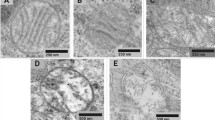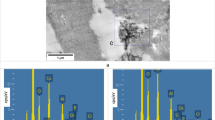Abstract
THE question of whether or not exposure to mercury vapour is equivalent to parenteral administration of mercuric ions for tissue accumulation is of great importance when evaluating experimental results for the purpose of setting threshold limits for mercury in ambient air. Clarkson et al.1 showed that mercury vapour is rapidly oxidized to mercury ions in the erythrocytes of the blood.
This is a preview of subscription content, access via your institution
Access options
Subscribe to this journal
Receive 51 print issues and online access
$199.00 per year
only $3.90 per issue
Buy this article
- Purchase on Springer Link
- Instant access to full article PDF
Prices may be subject to local taxes which are calculated during checkout
Similar content being viewed by others
References
Clarkson, T. W., Gatzy, J., and Dalton, C., Univ. Rochester AEP Rep., No. 582 (1961).
Hayes, A. D., and Rothstein, A., J. Pharmacol. and Exp. Therapeutics, 138, 1 (1962).
Matthes, F. T., Kirschner, R., Yow, M. D., and Brennan, J. C., Pediatrics, 22, 2, 675 (1958).
Berlin, M., and Ullberg, S., Arch. Environ. Health, 6, 589 (1963).
Author information
Authors and Affiliations
Rights and permissions
About this article
Cite this article
BERLIN, M., JOHANSSON, L. Mercury in Mouse Brain after Inhalation of Mercury Vapour and after Intravenous Injection of Mercury Salt. Nature 204, 85–86 (1964). https://doi.org/10.1038/204085a0
Issue Date:
DOI: https://doi.org/10.1038/204085a0
This article is cited by
-
Inhalation uptake of low level elemental mercury vapor and its tissue distribution in rats
Bulletin of Environmental Contamination and Toxicology (1980)
Comments
By submitting a comment you agree to abide by our Terms and Community Guidelines. If you find something abusive or that does not comply with our terms or guidelines please flag it as inappropriate.



